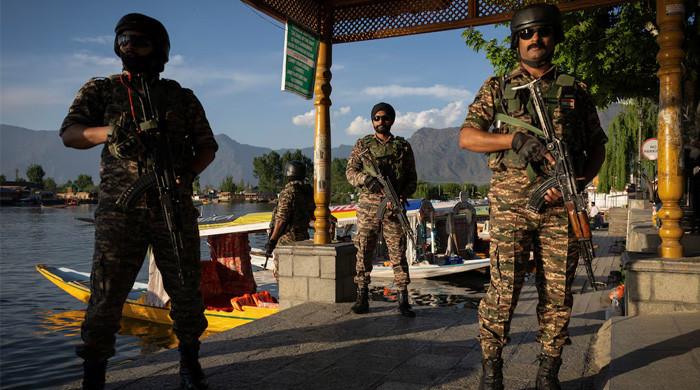India Seeks Global Support Amidst Rising Tensions with Pakistan
Amid escalating tensions with Pakistan following a tragic gun assault in Indian Illegally Occupied Jammu and Kashmir (IIOJK), India is actively pursuing international support. This effort seems geared less towards de-escalation and more toward bolstering its justification for potential military intervention.
Despite limited definitive evidence directly implicating Pakistan in the attack, a volatile confrontation between the two nuclear-armed nations is increasingly concerning, as per a New York Times report.
The NYT detailed that Indian Prime Minister Narendra Modi has urgently engaged with over a dozen global leaders through diplomatic channels following last week’s deadly incident. Concurrently, officials have reported the swift summoning of envoys from 100 foreign missions to the Ministry of External Affairs for important briefings.
However, this endeavor appears primarily aimed at building a rationale for military action against its neighbor, whom it accuses of having connections to the attack, rather than seeking assistance to defuse the situation. In a speech, Mr. Modi pledged severe consequences and the obliteration of terrorist havens, without explicitly naming Pakistan.
Within the occupied territory, Indian forces have initiated widespread crackdowns, detaining numerous individuals as they continue their search for the perpetrators.
Previously, India announced its intention to disrupt water flow to Pakistan, whose agricultural irrigation heavily relies on upstream rivers. They also mandated the immediate departure of certain personnel from Pakistan’s diplomatic mission, alongside Pakistani citizens visiting India.
Islamabad has stated its intent to suspend participation in bilateral agreements, including one impacting the “line of control” that demarcates the boundary between the two nations in disputed areas where a ceasefire had largely been maintained.
Moreover, anti-Muslim sentiments are growing in India, with Kashmiri students in other Indian cities encountering widespread harassment, compelling many to return to their homes.
Five days post-assault, where gunmen caused the deaths of 26 civilians, India has not formally identified any group as responsible nor presented substantial evidence supporting its claims of Pakistani involvement. The Pakistani government has refuted these allegations.
During briefings with diplomats, Indian officials referenced Pakistan’s historical backing of groups targeting India, according to diplomatic sources. Indian officials mentioned ongoing investigations and cited technical intelligence, like facial recognition data, linking the perpetrators to Pakistan.
Analysts and diplomats suggest that the limited evidence presented indicates either that India needs more time to gather information or that it feels minimal need to justify its planned actions, given the current global circumstances.
A military clash between India and Pakistan carries the risk of rapid escalation. While global pressure to restrain its response is largely absent, India has become quicker to assert itself as its diplomatic and economic influence grows.
The governments of Iran and Saudi Arabia have engaged with both sides, with Iran offering to mediate. The United Nations and the European Union have advocated for restraint and dialogue. However, major global powers are preoccupied with other pressing crises.
Officials in the Trump administration have expressed strong support for India’s counter-terrorism efforts, with President Trump acknowledging his amicable relations with both nations, while noting their historical disagreements.
However, Washington’s level of involvement remains uncertain, particularly with the ambassadorship to India still vacant three months into Trump’s term, indicating South Asia’s position on his list of priorities.
Even intervention attempts by the United States or other powers may have limited influence. India and Pakistan have engaged in multiple conflicts over Kashmir.
The initial response from Washington mirrored the Trump administration’s handling of the previous major conflict over Kashmir in 2019, according to Daniel Markey, a senior fellow at Johns Hopkins University.
That previous conflict was triggered by an attack resulting in the deaths of several Indian security personnel. The affiliation of the attackers was more clearly defined then.
The Trump White House signaled support for India. Diplomatic pressure for restraint increased only after India conducted a cross-border airstrike, whose impact was disputed. Pakistan retaliated by shooting down an Indian jet and capturing the pilot.
To compensate for that previous response, indications suggest India aims to do “something spectacular,” according to Markey. Pakistan has pledged to exceed any strike by India.
Markey stated that the tit-for-tat cycle could escalate quickly, and that the Indians and Pakistanis have inflated views of their own ability to manage escalation.
Last week’s claims of responsibility have been unclear, with uncertain information regarding the number of attackers involved.
This ambiguity may explain India’s emphasis on Pakistan’s “past patterns.”
One diplomat questioned the wisdom of potentially engaging in conflict with a nuclear-armed neighbor based solely on historical patterns.



Comments (0)
No comments yet. Be the first to comment!
Leave a Comment